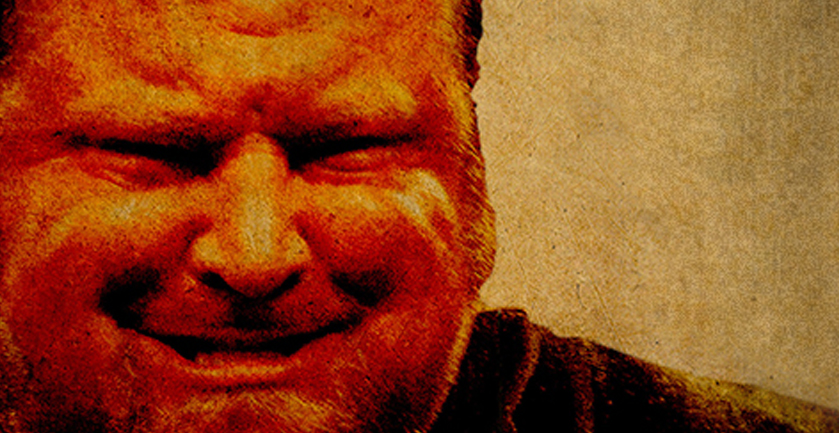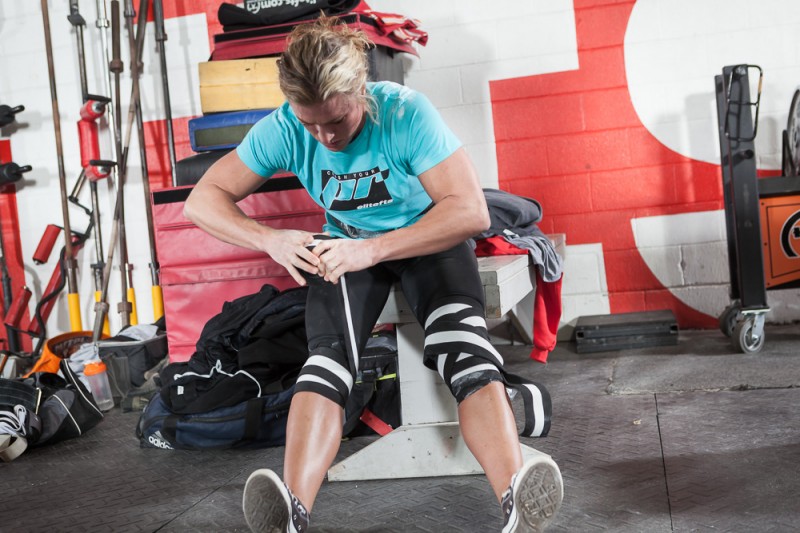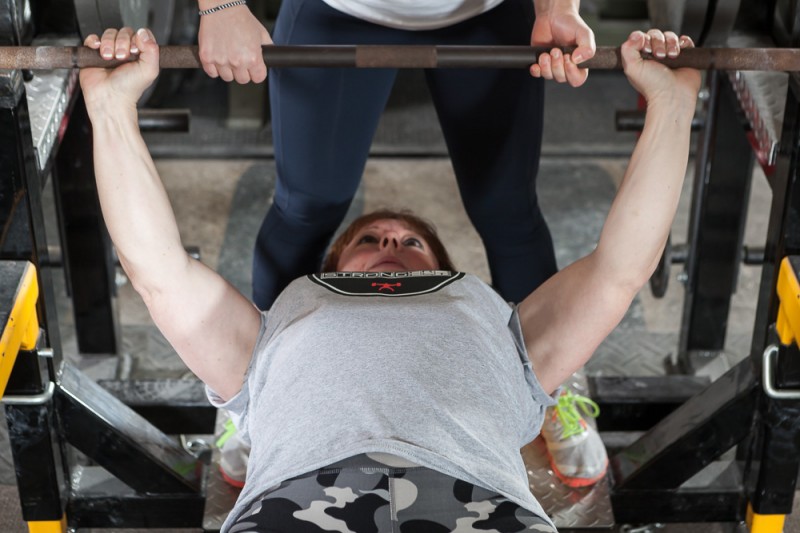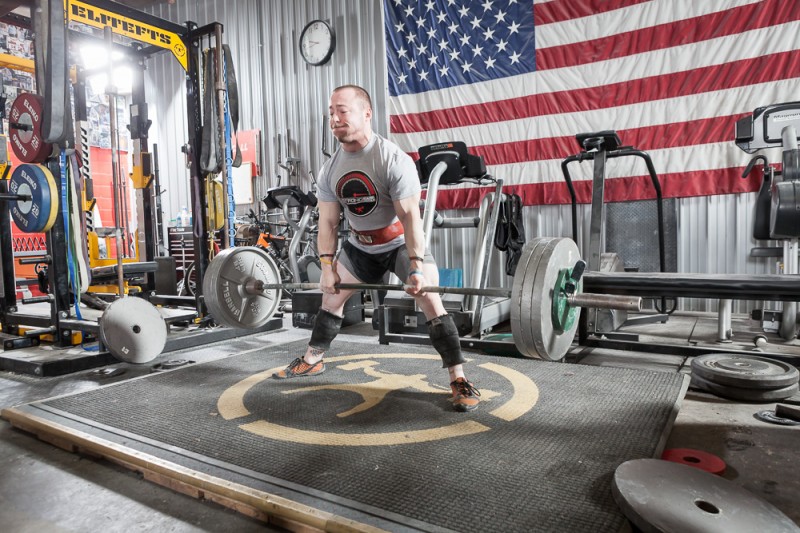
I believe that the mental aspect of lifting very often separates the elite lifters from the novice lifters. For me, the mental aspect has always been the greatest part of lifting. Don't get me wrong—I love the physical side, too, but I really get into the mental stuff.
There are many intricate components to the mental side of lifting and confidence is one of those. Confidence is a crucial part of being a successful strength athlete. It's also one of those components that is rarely talked about. It's very important in lifting, but don't make the mistake of confusing it for arrogance. These two sometimes look similar but are very different.
Arrogance is almost a show of confidence without the conviction. More often than not, arrogance is just that—a show. Deep down, the arrogant lifter doesn't really have confidence in himself. He acts the way that he does because he's trying to convince others and himself that he's confident. Most truly confident people show their confidence through their actions, not how they act. I'll use the base jumper, an extreme athlete, as an example. An arrogant one will put on a show. He'll be loud, act crazy, boast about his skills and basically act like an ass. He'll claim that he has done this so many times and that he can do it without any problem. This person may actually do the jump without any preparation in hopes of proving his confidence. This type of athlete doesn't usually stand the test of time.
On the other hand, the confident athlete will most likely be quiet about it with the exception of any promotions he needs to do. He may talk about his accomplishments, but he doesn't have any need to boast. This athlete will have full confidence in his abilities while also understanding that it's smart to take every advantage he can. He won't feel the need to put on a show or rush his jump. He will carefully take into consideration what is at risk and anything that can affect his chance of success. He will check the fall distance while calculating his drop rate and time for the chute to open. He will be aware of the weather and possible wind currents around the structure. He will have as much of a backup plan as possible. He will check everything and repack his own chute. He will examine and calculate every aspect of his jump. He doesn't just jump in and trust in his parachuting ability. His risks are calculated and controlled to the best of his ability.
The confident strength athlete isn't any different. The confident strength athlete won't just trust his raw strength alone. He'll set up complete training programs for his competitions. He'll calculate his nutrition, and he'll work on technique repeatedly. He'll get proper rest and recovery, and he'll work on injury prevention. If an injury does occur, he'll take the necessary means to heal it. He will plan every little detail leading up to an event. He is confident from day one that he will succeed, but he isn't arrogant enough to believe that he doesn't need to prepare. On competition day, he knows he's done everything in his ability to prepare and he's truly confident in his abilities.
It's a great thing to be surrounded by positive people who believe in you and who can strengthen your confidence, but true confidence comes from inside one's self. It comes from deep within you. You know that you can achieve your goals and this helps drive you toward those goals. If your confidence comes more from outside sources, what happens when those sources fail, leave or lose interest? It's great to have those external sources and it can boost your confidence, but it can't really create true confidence. That has to come from within you, and it has to be unwavering. When it comes from within, it isn't dependant on those external sources to keep it alive or to make it grow. It also means that negative external sources won't weaken it or lessen it. It has its own power and strength.
Confidence is what allows athletes to go out there and push the boundaries of their sport. It's what tells them that they are able to do what no others have done before. Even if they aren't the greatest, it tells them that they can make it and that they can reach the next level. If something goes wrong or they don't compete as planned, confidence helps them get back at it. It pushes them harder because they know they'll succeed. Confidence helps you get back up once you've fallen. Lifters break world records because they are confident in themselves and their abilities. They win championships because they are confident that they can. I've never heard a successful athlete say, "Maybe I can be the best." Deep down inside, he knew he could. Maybe he didn't always know how he would get there and maybe he didn't always feel like the best. Maybe at times he struggled badly. But through all that, he had confidence that he wouldn't quit until he got where he wanted to be. There are a multitude of things that have to happen in order to be one of the best, and confidence is definitely one of those things.
I'm not saying that I always had confidence when it came to lifting. I trained it like I trained my strength. Once I decided to get serious about lifting, I did have confidence. I wasn't always sure how I was going to reach the top level, but I knew I would. I knew I would keep trying until I figured it out. When I was doing my first few meets, I knew that I wasn't the best. I knew I wasn't world class or even a state champion. But I had a plan and I would be all those things.
I approached my first 600-pound squat like I did my 1100-pound squat. I was confident in the effort that I had put in preparing for that meet and I knew I would get what I trained for. Even when I didn't always get the weight, I never lost my confidence. Instead, I figured out what I had done wrong and I was confident that I could fix it to get the weight and more the next time. When I was going for world records, I was confident. When I was opening with higher openers than had ever been done before, I was confident. When I went after championships, I was confident. Of course, I didn't always get what I was going for, but I never let it deter my confidence. Even when I told my training partners about the things that I wanted to accomplish and they would try to let me down easy, I wouldn't believe them and I didn't lose confidence.
I could see where they were coming from though. What were the odds that someone like me could get to that level? How would a 1700-pound total become a 2700-pound total? The odds were against me and I knew that this was all they meant. But in my mind, that wasn't going to stop me. They just didn't see it from my perspective. Someone was going to break records. Why couldn't that someone be me? I would outwork and outlearn my competitors. I would out heart and out will them all. If I would've listened to the odds or believed that I was the long shot, I wouldn't have reached the level that I did. It was confidence that allowed me to keep sacrificing, to keep working, to keep trying and to keep picking myself back up. Confidence allowed me to see the finish line years and years in the future.
So are people just born with confidence, or is it something you can learn? I've always liked hanging out with kids more than adults. Kids are like adults without all the annoying habits they've learned in adulthood. Being around kids like my nieces and nephews, I've noticed a lot. I've seen some kids who just seem naturally confident. They're willing to try anything and almost expect that they'll be good at it. I've also seen many kids who don't want to try new things for fear of not being good at it. I've learned that either of those kids could end up being the complete opposite. I've seen kids without any fear and lots of confidence turn into young adults without any confidence at all. I've seen the fearful kid turn into a giant of confidence. This leads me to believe that confidence is like strength, and if trained correctly, it will become stronger.
I've seen this in adult lifters I've worked with. One lifter in particular was extremely superstitious. He would seem or act confident, but the slightest upset to his program would throw what should have been a good meet in the dumpster. For example, a black crow flying in front of him on the way to the meet would set off a chain reaction of bad thoughts because he saw that as bad luck. If he didn't like the set up of the meet or if the equipment wasn't up to his standards, he would spiral down. If I slipped a knee wrap, he would freak out even though I had another right there ready to go. If there was a gap in his wraps, it would throw him off. This frustrated the crap out of me because I'm the exact opposite. Almost nothing deters my thinking about what I want to achieve. I'm confident, and I will block any negativity out. Once this lifter started training with me, I went to work on his problem. Although I teased him about this from time to time, I didn't want him to know that I was consciously working on his confidence.
RELATED: Small, Average, Great — What is Your Mindset?
Building a person's confidence is a very individual thing and how you do it will depend greatly on that person's personality. Let's just say that when it comes to training, I'm not a very sensitive person. This particular lifter was actually very hard-headed and tough. He loved to fight and was confident in his ability to beat guys senseless, but he didn't have a ton of experience in athletic endeavors. I love hardheaded people because I have some understanding of them. With this lifter, I was able to keep any praise from him until he really deserved it. He was hardheaded enough that I knew he wouldn't quit, and he was the type of guy who understood that when I gave praise, I f*&^%$# meant it. He knew that he had accomplished something and it wasn't some bullshit idol complement.
I continually tested him in training and gradually built his confidence. We were able to make gains quickly, which helped. I often gave him one shot at getting a PR, which simulates a meet. If he missed it, he was done and he would have to stew on it until the next training session. This may seem counterproductive to building confidence, but I knew his personality. While stewing on it, he would continue to get angrier and, for him (me too), anger is a powerful weapon. By the time he got to try that lift again, he was so pissed off that all he could think about was getting the lift because he didn't want to go through another week of feeling that way.
Over time, we gradually built him up, and within a few years, I no longer had to worry about what would throw things off going to the meet or at the meet. He would become more like a caged animal who couldn't wait to get out to lift some weight. This style won't work for everyone and, in fact, will crush some people. If you're a coach or even a parent, you need to consider the person or child's personality and what he will best respond to. Personality will also dictate how long it will take to build good confidence. I've had people I need to coddle and it is extremely difficult and frustrating for me, so I'll usually recommend they work with someone else. Just as important as it is to know the personality of the person you're coaching, it's just as important to know your own personality. Yes, I can do it, but it isn't how I make my living, so in some cases, I feel they are better off with another coach.
Confidence is just like strength in that it takes consistency and hard work. It's also like a muscle that, if worked, will continue to get stronger, but slack off and it will get weaker. I think confidence can and should be worked on in all aspects of life. So what is your level of consistency and what are you willing to do to improve it? What will or can you do to improve it? Like they say, practice makes perfect. Put yourself in a situation that isn't too difficult but one that might make you question your confidence. Go into it being ready to pump yourself up and have a thought out speech ready to help your confidence. The equivalent in the gym is to push your max lifts or even push the number of reps that you think you can get. You have to test yourself to see how you will do and learn to be better. If you do falter, don't let it bother you. It was only a test. Analyze it and find things that you can improve on next time. I still have some trouble with public speaking, but I love doing it because it's a chance for me to improve myself and my confidence. I simply look at it as something to conquer, and even if I flub up, I know that I'll eventually master it. If I never do it, I'll never succeed at it.
My favorite tool for confidence is visualization. If you can see it in your mind's eye, you can achieve it. I was recently helping a lifter at the gym and talking about how the gym is just a small part of training strength. I taught him about visualization and what a great tool it is. I explained how you should visualize from your own perspective as well as from an outside perspective. Your own perspective is seeing and feeling yourself successfully getting a lift. You imagine yourself doing the lift and you try to see what you would see through your own eyes. The outside perspective is viewing yourself successfully doing the lift from another person's point of view like you're watching a video of yourself getting the lift. I explained to this lifter that it needs to be done more often than just before the lift at the meet or at the gym. It can be done any time and should be done often. I told him about how I would sit in my room against the wall with the lights off and set a timer for 30 minutes. For the entire time, I just visualized lifts.
MORE: The 3 Steps of Practicing Visualization
He did as I suggested and then went to his next meet and raw squatted a low 900 pounds at the age of 20, which I believe is the biggest squat for someone his age. The next day, he texted me that he felt like he had already done the lift before the meet started. He had already seen himself do the weight, and he had already felt himself do the weight. He had plenty of confidence once he finally got under it.
I still believe that heart is the most important part of being a successful strength athlete, but I think confidence has a very close relationship to heart. Heart helps a person believe in himself, and believing is basically confidence. I see so many lifters with great potential, but they never reach the level they could because they don't believe in themselves. They spend all kinds of time on training, recovery, nutrition and other things, but they forget or don't know how to work on their confidence. The gym is just a small part of being a successful strength athlete and so much of the other stuff rarely gets discussed. I want to talk about it and hopefully get people thinking about things like confidence. So where is your confidence and what are you willing to do to strengthen it?













